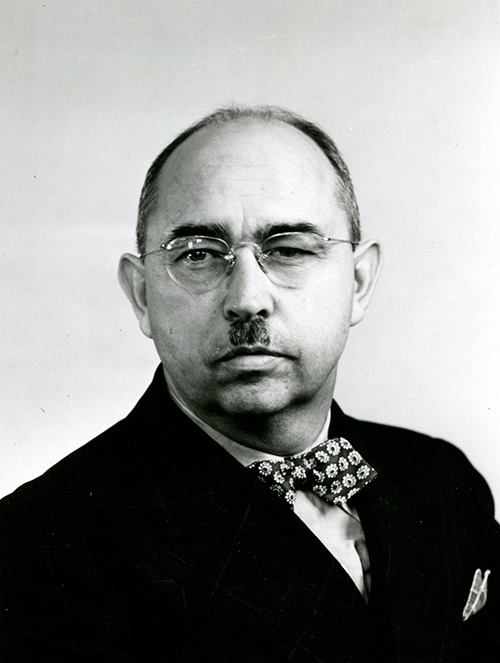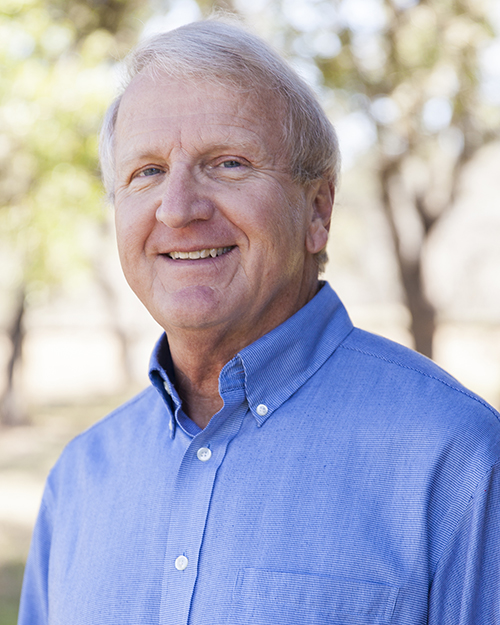Otto Gross, '28, excelled at math and wanted to become an actuary, yet there wasn't a formal actuarial science program at the University of Nebraska–Lincoln in 1924. By convincing math professor Floyd S. Harper to teach him actuarial mathematics, Gross and his friends became the first actuarial science students at Nebraska and helped jumpstart careers for all involved including future actuarial science students across the nation.
"Otto and three friends asked Floyd Harper, who was a math professor, to teach them the equivalent of today's Theory of Interest (ACTS 440) and Life Contingencies (ACTS 470) course. This provided them with enough of a start in the field so when they graduated, they could be employed as actuaries. Each year after that, Floyd would teach actuarial math to a group of students in order to provide actuaries to local companies. Otto, his friends and Floyd are referred to as the pioneers of Actuarial Science at Nebraska," said Sue Vagts, director of the Actuarial Science Program, Ameritas Actuarial Faculty Fellow, David P. Hayes Chair of Actuarial Science and professor of practice in actuarial science at the College of Business.
 Floyd Harper first taught actuarial math to students in 1924.
Floyd Harper first taught actuarial math to students in 1924.
Gross worked at Midwest Life while a Nebraska student and after graduation and then became an actuary and examiner for the state of Iowa Insurance Department. He went on to become an actuary and executive for several insurance companies and retired as senior vice president at First American Life in Houston in 1977. He remained friends with Harper throughout his life and exchanged Christmas cards with his family long after the math professor passed away. Otto died at the age of 98 in 2004.
"It's interesting how that one year in Nebraska's history played such a central role for actuarial science students, not only at Nebraska, but across the nation. When Floyd left the university in the late 1940s, he started Actuarial Science programs at Drake University and Georgia State. Both of those programs, along with ours at Nebraska, were in the first group to be named Centers for Actuarial Excellence in the U.S. designated by the Society of Actuaries, and today there are only 22 total programs in the U.S. recognized," she said. "Three of those programs have roots in Nebraska."
Nebraska decided to "grow their own" actuaries in 1957 and started an official program at the university. Eighteen Nebraska insurance companies contributed funds, and the Nebraska Actuaries Club formed a committee to oversee it. Today the program is part of the university and still strongly supported by industry professionals.
Otto's son, Gary, started the Otto Gross Fund to honor his father and provide scholarships for actuarial science students. Born in Saratov, Russia, Otto and his family moved to Lincoln in 1913. Living in what was called the North Bottoms near the railroad tracks with the university in their backyard, Otto and his sister both became Huskers.
"No one in the family had the chance to go to college before that and few women went to college back then. Although my grandfather was listed as a farmer or laborer in immigration and census documents and my grandmother cleaned houses, he got a job with the railroad as a machinist. Then they sent both of their kids to college. In honor of the importance of education in our family, I wanted to endow a scholarship in my dad's name at Nebraska," said Gary.
 Gary Gross provided $100,000 in matching gifts to honor his father, Otto.
Gary Gross provided $100,000 in matching gifts to honor his father, Otto.
Last spring, Gary said he contacted the University of Nebraska Foundation to increase the scholarship and provide additional funding to more students.
"I wanted to make it a more meaningful scholarship and knew we were coming up on the century mark of my dad, his classmates and Professor Harper initiating this program. I decided if we could tie it all together, I would triple my initial investment to the university while continuing to honor my dad and family who felt so strongly about the importance of education," Gary said.
Gary, who also became an actuary, provided a $100,000 matching gift for the Actuarial Science Program at Nebraska — $50,000 for the Otto Gross Fund for scholarships and $50,000 for the World Class Actuarial Science Fund for student and faculty support. He hopes the matching provides the incentive for others to help raise funds for both areas of the program.
"My dad and his sister were proud to be Huskers and living proof of how important education was in our family. I'm glad I was able to give back in this way," Gary said.
To provide a gift to be matched by Gary, go to:
Published: August 29, 2024